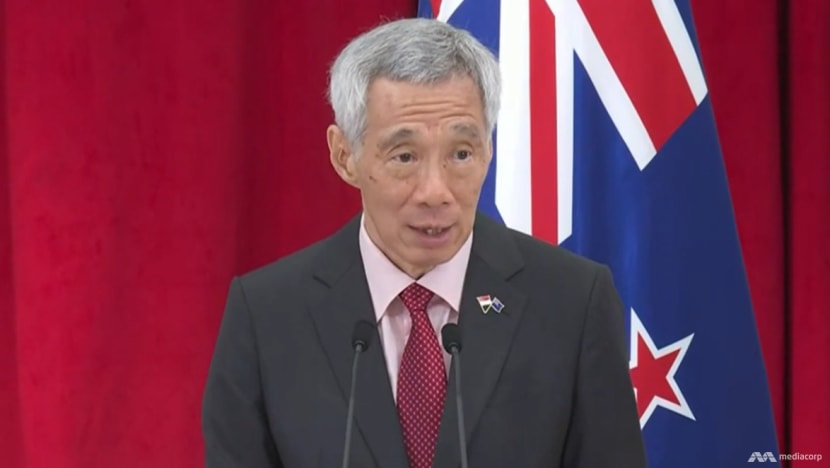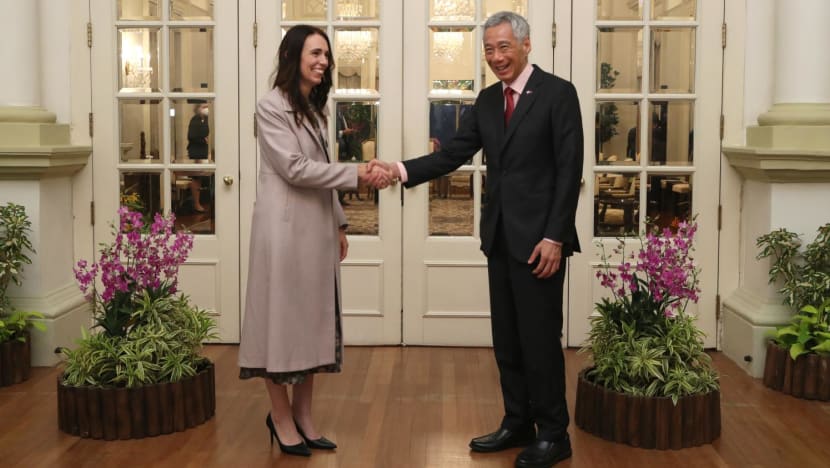PM Lee says Ukraine conflict will impact US-China relations; hopes wisdom will prevail

Singapore Prime Minister Lee Hsien Loong speaking at a joint press conference with New Zealand Prime Minister Jacinda Ardern at the Istana in Singapore on Apr 19, 2022.
SINGAPORE: Prime Minister Lee Hsien Loong said on Tuesday (Apr 19) that because the situation in Ukraine has an impact on Russia-China ties, it will in turn affect US-China relations.
Mr Lee was speaking at a joint press conference with New Zealand Prime Minister Jacinda Ardern at the Istana in Singapore, where she is on a three-day official visit to deepen cooperation in areas like climate change and business links.
"We do watch the situation in Ukraine and how that will impact China-Russia relations and therefore China-US relations," he said.
"We both have a vested interest in China-US relations being stable and not being complicated or further sharpened in terms of hostility or lack of trust on both sides. And we hope that wisdom will prevail and Ukraine will not make things more complex."
Related:
Russian forces on Tuesday launched their anticipated offensive in the Donbas region in eastern Ukraine, in what Ukrainian officials described as the second phase of the war.
The White House said US President Joe Biden would hold a call with allies on Tuesday to discuss the Ukraine crisis, including on how to coordinate on holding Russia accountable. China has resisted pressure from Western countries to condemn Russia's invasion.
When it comes to engaging China on the war in Ukraine, Ms Ardern said New Zealand "keeps sending the same message".
"What's happening in Ukraine is an assault on a country's sovereignty and their territorial integrity. And you'll find countries like China referencing that, embracing that as an issue," she said.
"And so we continue to encourage, at every level, China to continue to acknowledge what the Ukraine conflict represents for the world."
Mr Lee said he and Ms Ardern agreed on the importance of an open and inclusive regional architecture that supports their strengths and challenges and are both "staunch supporters" of international law and the principles enshrined in the UN Charter.
"And that's why both Singapore and New Zealand have strongly condemned the Russian invasion of Ukraine," he said.

A joint statement from both prime ministers, published by Singapore's Ministry of Foreign Affairs, said they agreed that actions by Russia are a "flagrant violation" of fundamental principles of international law and risk long-term global instability.
They also called on all parties to protect civilians and respect human rights, and facilitate unhindered humanitarian assistance to those in need in Ukraine.
Ms Ardern said the Ukraine conflict is putting "considerable pressure" on the international rules-based order, stressing that disputes must be solved through dialogue and not "intimidation or coercion".
"We look forward to continuing to work with like-minded countries such as Singapore to support the resolution of such conflicts through peaceful means, including conflicts and issues such as those we see in Myanmar and our region also."
WILL THE US REJOIN PACIFIC TRADE PACT?
Singapore and New Zealand, together with Australia, Brunei Darussalam, Canada, Chile, Japan, Malaysia, Mexico, Peru and Vietnam, are also part of the Comprehensive and Progressive Agreement for Trans-Pacific Partnership (CPTPP).
The Pacific free trade agreement is the successor of the Trans-Pacific Partnership (TPP), which brought together a disparate group of 12 nations around the Pacific rim, including Singapore and the US, to draw up a more ambitious set of trading rules.
The TPP died in January 2017, when the new Trump administration withdrew from the agreement despite it already being signed, and the 11 remaining nations decided to continue as the CPTPP. Economies like China, Taiwan and South Korea have since shown interest in joining the pact.
When asked on Tuesday what Singapore is willing to compromise to get the US to rejoin the CPTPP, Mr Lee said he does not think the US is asking for any compromise.
"We would dearly love to see them come back, but they have told us quite clearly it's nothing to do with us. It's just off the table because their own politics does not make it possible at present," he said.
"And meanwhile, they wish to remain engaged in the region by whatever means feasible politically but which will demonstrate their continuing commitment to the Asia-Pacific and their stake here."
One of these means is the idea of an Indo-Pacific economic framework, and Mr Lee said Singapore and New Zealand support this "because we believe that it's good for you to continue to be present in this region".
"And we hope that we'll be able to put as much substance as possible on that Indo-Pacific economic framework. And I think that's what they're trying to do," he added.
Ms Ardern reiterated that the US' domestic considerations mean the CPTPP "is not the most realistic option" for it.
"That does not mean there is no option. And it's our job to make sure that we continue to engage and offering up those opportunities where the United States can demonstrate an engagement in the economic architecture and the economic wellbeing of this region," she said.
DIGITAL ECONOMY PARTNERSHIP
Moving on to other regional agreements, Mr Lee touched on the the Digital Economy Partnership Agreement (DEPA) between Singapore, Chile and New Zealand, signed in June 2020.
DEPA is a first-of-its-kind agreement that establishes new approaches and collaborations in digital trade issues and promotes interoperability between different regimes. China and South Korea have applied to join DEPA.
Mr Lee said Singapore and New Zealand welcome applications to join DEPA, noting that it is designed to be an open and inclusive "plurilateral" digital agreement.
"We welcome the interest and participation of economies which can commit to all of the DEPA provisions and collaborate in these areas to advance a global digital economy," he said.
"It's a pathfinder agreement, so there will be some level of experimentation with like-minded partners, and I hope that aspiring economies can embrace the discipline of exploration and identify projects of mutual interest."
Mr Lee said he cannot give a timeline on these new applications, pointing out that it depends on how discussions go and the issues that come up.
"But ideally, of course, you would like the new participants to sign on to everything which is already in the DEPA rather than having to make compromises in order to widen the participation."















